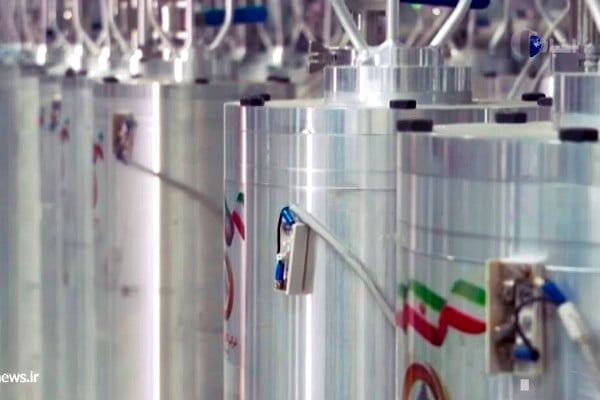According to the latest report from the IAEA, Iran holds 30 times the stockpile of uranium allowed under the nuclear accord and has enriched it to near-weapons-grade levels.
By JNS
Israel and the United States have agreed to reschedule a high-level meeting on the Iranian threat that was canceled after Israeli Prime Minister Benjamin Netanyahu accused the Biden administration of withholding arms from Jerusalem, Axios reported on Tuesday.
The decision reportedly comes amid growing concern in Israel over Iran’s efforts to weaponize components of its nuclear program.
The U.S.-Israel Strategic Consultative Group (SCG), which was formed during the Obama administration, has not convened since March of last year.
The “strategic dialogue” is led by U.S. National Security Advisor Jake Sullivan and his Israeli counterpart Tzachi Hanegbi, and includes officials from the U.S. State Department, Pentagon and intelligence agencies.
The Axios report, citing five Israeli officials, said the date for the meeting has not been set, but that is expected to take place next month, prior to Netanyahu’s planned address to Congress on July 24.
Netanyahu raised Washington’s ire last week by stating that he had told U.S. Secretary of State Antony Blinken during a recent visit to the Jewish state that it is “inconceivable” for the administration to withhold weapons and ammunition from Israel amid its war with Hamas in Gaza.
“When Secretary Blinken was recently here in Israel, we had a candid conversation. I said I deeply appreciated the support the U.S. has given Israel from the beginning of the war. But I also said something else. I said it’s inconceivable that in the past few months, the administration has been withholding weapons and ammunition to Israel,” the premier said in a video message.
“Israel, America’s closest ally, fighting for its life, fighting against Iran and our other common enemies,” Netanyahu continued.
“Secretary Blinken assured me that the administration is working day and night to remove these bottlenecks. I certainly hope that’s the case. It should be the case.”
The United Kingdom’s ambassador to the United Nations said on Monday that London and other European parties are prepared to reinstate sanctions on Iran should it continue to advance its nuclear program.
“Given Iran’s dangerous advances which have brought it to the brink of being able to develop a weapon, this situation should be of grave concern for this council,” Ambassador Barbara Woodward told a U.N. Security Council meeting focusing on implementation of the 2015 Joint Comprehensive Plan of Action (JCPOA), commonly known as the Iran nuclear deal.
The JCPOA, given the force of international law by a Security Council resolution, included what’s known as a “snap back” mechanism, whereby any signatory to the accord can claim Iran is in violation of its terms, almost inevitably leading to the restoration of the sanctions in place before the pact’s signing.
The Trump administration pulled out of the JCPOA in 2018, and since then Iran has violated a number of its terms, daring international organizations to take action.
According to the latest report from the International Atomic Energy Agency, Iran holds 30 times the stockpile of uranium allowed under the nuclear accord, and has enriched it to near-weapons-grade levels.
Last week, The Washington Post reported that an expansion underway at Iran’s Fordow enrichment plant could allow the regime to accumulate several bombs’ worth of nuclear fuel every month.
According to the report, the Atomic Energy Organization of Iran had informed the International Atomic Energy Agency of its plan to install some 1,400 new centrifuges at the heavily guarded underground facility, which would triple the production of enriched uranium at Fordow alone.
After a leaked draft of Iran’s plans was initially reported by Reuters on June 13, U.S. State Department spokesman Matthew Miller charged the Islamic Republic with “expanding its nuclear program in ways that have no credible peaceful purpose” and vowed to “respond accordingly.”
Tehran has continued to ramp up enrichment while maintaining that its nuclear program is strictly peaceful. Iran’s stockpile of 60%-enriched uranium has increased by 20.6 kilograms (45.5 pounds) since February, AFP reported on May 27, citing a new IAEA report.
The confidential document, which was also seen by the Associated Press, revealed that Tehran had accumulated 142.1 kilograms (313.2 pounds) of uranium enriched up to 60%.
This level of enrichment is just a technical step from 90% enrichment, considered weapons grade.
According to the IAEA definition, it is technically possible to create an atomic bomb with roughly 42 kilograms (92.5 pounds) of uranium enriched to 60% if the material is further enriched to 90%.
Iran has recently threatened a push towards the bomb. On May 9, an adviser to Khamenei warned that Tehran would weaponize its nuclear program if Israel “threatens its existence.”
Also, last month, a lawmaker close to the regime suggested that the country might already possess an atomic bomb, saying: “In my opinion, we have achieved nuclear weapons, but we do not announce it.”


